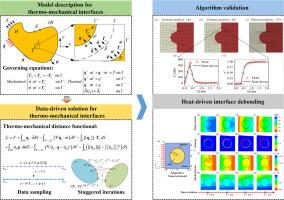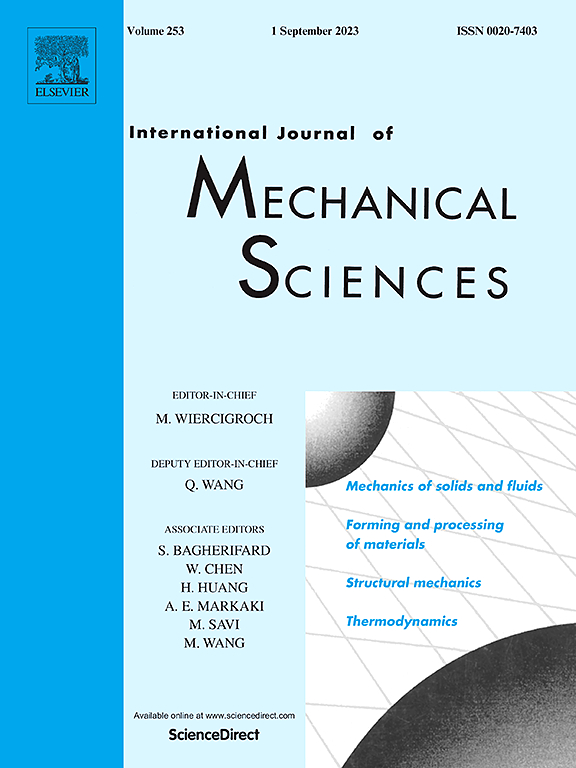Data-driven Thermo-mechanical Interfaces: Thermal Mismatch Induced Interface Debonding
IF 9.4
1区 工程技术
Q1 ENGINEERING, MECHANICAL
International Journal of Mechanical Sciences
Pub Date : 2025-09-26
DOI:10.1016/j.ijmecsci.2025.110881
引用次数: 0
Abstract
In this work, a model-free data-driven framework is proposed to simulate interface debonding induced by the thermal mismatch. The material phase space is expanded and a new thermo-mechanical distance norm is formulated, incorporating three canonical conjugate pairs: traction–separation, temperature–internal energy, and temperature gradient–heat flux. The thermo-mechanical coupling interactions of interface are naturally encoded by the given material database and the complex constitutive relations are not necessary herein. The proposed data-driven is enriched by an internal variable-based parameterization to construct a time-evolving database for enforcing monotonic increase of interface damage evolution. Several numerical examples are provided to evaluate the accuracy and efficiency of the proposed approach. First, the thermo-mechanical data-driven model is benchmarked against classical finite element results, with convergence behavior analyzed in detail. Second, parametric studies are conducted on key interfacial properties, including superficial heat capacity and interfacial thermal conductivity, demonstrating the capability of the developed data-driven method to capture essential features of heat transfer across interfaces. Finally, the proposed framework is applied to simulate interface debonding driven by thermal mismatch in different cases, successfully capturing the coupled evolution of heat conduction and interfacial degradation. The results confirm that the data-driven formulation provides a novel numerical tool to describe the interplay between thermal fields and damage processes at material of interfaces.

数据驱动的热机械界面:热失配引起的界面剥离
在这项工作中,提出了一个无模型数据驱动的框架来模拟由热失配引起的界面脱粘。扩展了材料相空间,建立了一个新的热-机械距离范数,包含三个典型共轭对:牵引-分离、温度-内能和温度梯度-热流。界面的热-力耦合相互作用由给定的材料数据库自然编码,不需要复杂的本构关系。在数据驱动的基础上,引入内部变量参数化,构建时间演化数据库,实现界面损伤演化的单调递增。算例验证了该方法的精度和效率。首先,将热力学数据驱动模型与经典有限元结果进行对比,详细分析了模型的收敛行为。其次,对关键界面特性进行了参数化研究,包括表面热容量和界面导热系数,证明了所开发的数据驱动方法能够捕获界面间传热的基本特征。最后,将所提出的框架应用于模拟不同情况下热失配驱动的界面脱粘,成功捕获了热传导和界面降解的耦合演化。结果表明,数据驱动公式为描述材料界面处热场与损伤过程之间的相互作用提供了一种新的数值工具。
本文章由计算机程序翻译,如有差异,请以英文原文为准。
求助全文
约1分钟内获得全文
求助全文
来源期刊

International Journal of Mechanical Sciences
工程技术-工程:机械
CiteScore
12.80
自引率
17.80%
发文量
769
审稿时长
19 days
期刊介绍:
The International Journal of Mechanical Sciences (IJMS) serves as a global platform for the publication and dissemination of original research that contributes to a deeper scientific understanding of the fundamental disciplines within mechanical, civil, and material engineering.
The primary focus of IJMS is to showcase innovative and ground-breaking work that utilizes analytical and computational modeling techniques, such as Finite Element Method (FEM), Boundary Element Method (BEM), and mesh-free methods, among others. These modeling methods are applied to diverse fields including rigid-body mechanics (e.g., dynamics, vibration, stability), structural mechanics, metal forming, advanced materials (e.g., metals, composites, cellular, smart) behavior and applications, impact mechanics, strain localization, and other nonlinear effects (e.g., large deflections, plasticity, fracture).
Additionally, IJMS covers the realms of fluid mechanics (both external and internal flows), tribology, thermodynamics, and materials processing. These subjects collectively form the core of the journal's content.
In summary, IJMS provides a prestigious platform for researchers to present their original contributions, shedding light on analytical and computational modeling methods in various areas of mechanical engineering, as well as exploring the behavior and application of advanced materials, fluid mechanics, thermodynamics, and materials processing.
 求助内容:
求助内容: 应助结果提醒方式:
应助结果提醒方式:


